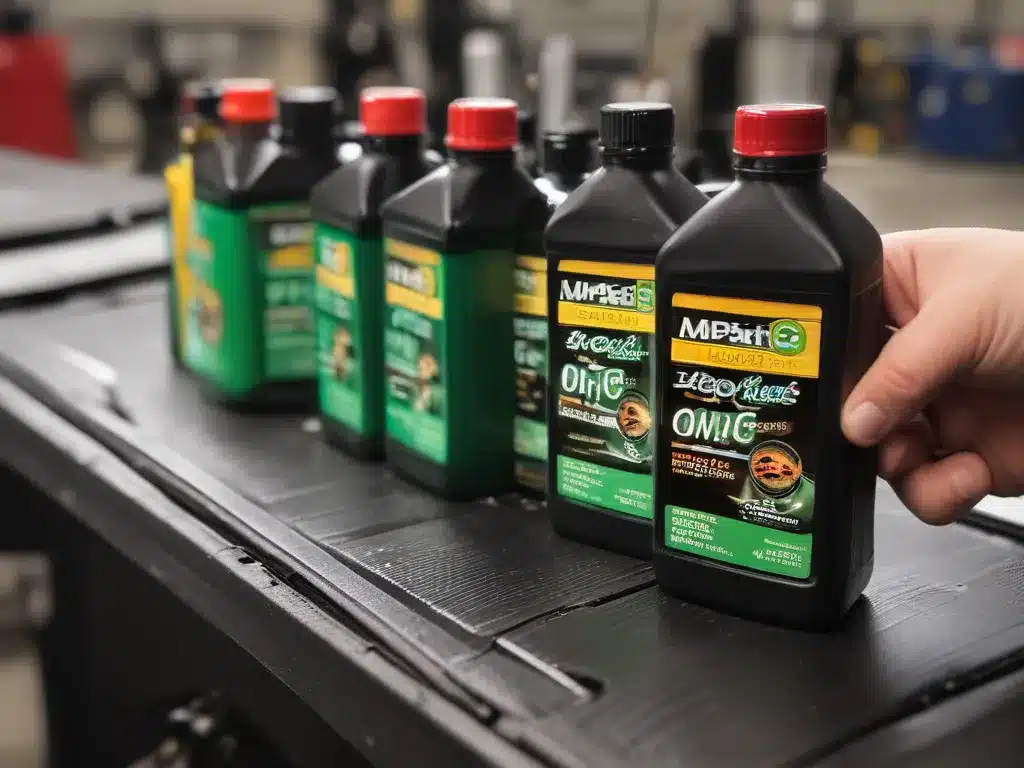
The Great Synthetic Oil Debate
Ah, the age-old question that has been puzzling car enthusiasts and maintenance experts for decades – do synthetic oils really improve fuel efficiency, or is it all just a bunch of hype? As someone who’s been working on cars for the better part of my life, I can tell you that this is a topic that’s near and dear to my heart.
I remember when I first started out, I was all about the conventional oil. “Why would I spend extra on that fancy synthetic stuff?” I’d scoff. “It’s just a ploy by the oil companies to get more of my hard-earned cash!” But then, something happened that changed my tune…
I had this old beater of a car, a real rust bucket that had seen better days. But you know what they say, “don’t judge a book by its cover!” This thing was an absolute workhorse, and I loved it to bits. Anyway, one day I’m driving down the highway, minding my own business, when all of a sudden I hear this god-awful rattling sound coming from the engine. My heart sank – I just knew something was wrong.
Synthetic Oil to the Rescue
Long story short, I took it to my trusted mechanic, and he told me that the engine was starting to show its age. The conventional oil I’d been using just wasn’t cutting it anymore, and the engine was starting to lose its mojo. “But don’t worry,” he said, “I’ve got just the solution – synthetic oil!”
Now, I’ll admit, I was a bit skeptical at first. After all, I’d heard all the claims about how synthetic oil can boost fuel economy and extend engine life, but I’d always chalked it up to marketing hype. But my mechanic, bless his heart, was having none of my skepticism. “Just trust me on this one,” he said. “Give it a try, and you’ll see the difference for yourself.”
Putting Synthetic Oil to the Test
So, I bit the bullet and had him flush the old conventional oil and fill ‘er up with the good stuff. And let me tell you, I was not prepared for what happened next. As soon as I hit the road, I could feel a difference. The engine was running smoother, quieter, and (dare I say it) more… peppy? It was like the old girl had a new lease on life.
But the real kicker was when I looked down at the fuel gauge. I couldn’t believe my eyes – the needle was barely moving! I’d normally be refueling every couple of days, but now I was going almost a week between fill-ups. “No way,” I thought to myself. “This has to be a fluke.”
The Proof is in the Pudding
So, I decided to put it to the test. I drove the same route, at the same speeds, with the same driving habits, and kept meticulous records of my fuel consumption. And you know what? The numbers didn’t lie. With the synthetic oil, I was getting a solid 3-4 miles per gallon more than I had with the conventional stuff.
Now, I know what you’re thinking – “3-4 MPG, that’s not exactly a game-changer, is it?” And you know what, you’re right. It’s not like I was suddenly getting 50 MPG or anything. But when you consider the fact that I was driving a 20-year-old car with over 200,000 miles on the clock, that kind of improvement is pretty darn impressive.
The Science Behind Synthetic Oil
But what is it about synthetic oil that makes it so much more efficient than conventional? Well, it all comes down to the molecular structure. Synthetic oils are engineered in a lab, with the molecules carefully crafted to be smaller, more uniform, and more slippery than their natural, petroleum-based counterparts.
This means that the oil can flow more easily through the engine, reducing friction and drag. And when there’s less resistance, the engine doesn’t have to work as hard, which in turn leads to improved fuel efficiency. It’s kind of like the difference between trying to push a boulder up a hill versus a smooth, polished marble – the marble is just gonna glide right up, no problem.
Real-World Synthetic Oil Benefits
But the benefits of synthetic oil don’t stop at just improved MPG. Oh no, my friends, there’s so much more! For one, synthetic oils are much more resistant to breakdown and degradation, which means they can last a lot longer between changes. That’s a huge bonus for those of us who like to push the limits of our oil change intervals (hey, I’m not judging, I’ve been there too!).
And let’s not forget about engine protection. Synthetic oils are formulated to be more stable under extreme temperatures and pressures, which means they can keep your engine running smoothly and efficiently for a whole lot longer. I’ve seen engines with over 300,000 miles on them still purring like kittens, all thanks to the magic of synthetic oil.
The Verdict: Synthetic Oil is Worth It
So, in the end, is synthetic oil really worth the extra cost? In my humble opinion, the answer is a resounding yes. Sure, you might pay a bit more upfront, but the long-term benefits in terms of improved fuel efficiency, extended oil change intervals, and enhanced engine protection more than make up for it.
And let’s be real here – when it comes to your beloved ride, isn’t it worth a few extra bucks to keep it running like a champ? I know my old beater is practically family to me, and I’ll do whatever it takes to keep it on the road and happy. So, if you ask me, making the switch to synthetic oil is a no-brainer. Your wallet and your engine will thank you for it.


